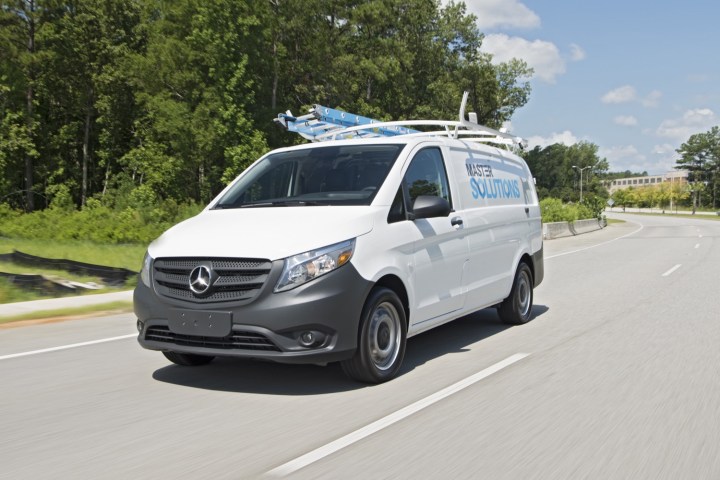
The Mercedes-Benz Metris Worker is a stripped-down version of the Metris midsize van that was introduced last year. Like the larger Sprinter Worker, it’s intended primarily for businesses and fleet buyers that care more about low costs and functionality than interior amenities.
Available in both passenger and cargo configurations, the Worker is definitely the no-frills model of the Metris lineup. It rides on basic steel wheels, with unpainted plastic bumpers. The cargo version is available only in white, to accommodate decals and custom paint. Passenger versions are offered in black or silver, because those are the most popular colors for shuttle and limousine companies, Mercedes says.
The Worker uses the same powertrain as other Metris models. A 2.0-liter turbocharged four-cylinder engine produces 208 horsepower and 258 pound-feet of torque, which is channeled to the rear wheels through a seven-speed automatic transmission. Mercedes claims a cargo capacity of 2,500 pounds and a towing capacity of 5,000 pounds. The cargo version can hold 60 sheets of drywall or plywood, a relevant statistic for Mercedes’ targeted commercial customers, or particularly zealous DIYers.
Despite its Spartan nature, the Metris Worker does offer some tech. The standard audio system includes Bluetooth and a USB port, and driver aids including attention assist, crosswind assist, and hill start assist are standard. Lane keeping assist, blind spot monitoring, and a rearview camera are optional.
The Metris Worker cargo van starts at $26,990, while the passenger version starts at $30,990 (both prices include destination). A focus on business buyers should help Mercedes stand out in a growing van market that includes many new and recently updated models from the likes of Ford, Ram, and Nissan.
Editors' Recommendations
- Mercedes’ electric eSprinter isn’t just greener, it’s better
- Mercedes-Maybach EQS SUV is old-school luxury — electrified
- Mercedes-Benz EQS SUV is a luxury SUV for the family
- Outdoorsy lets you buy a fully equipped camper van with just a few clicks


